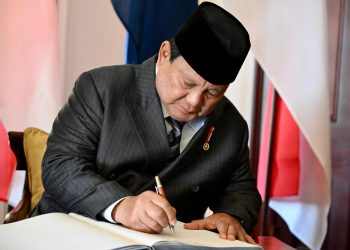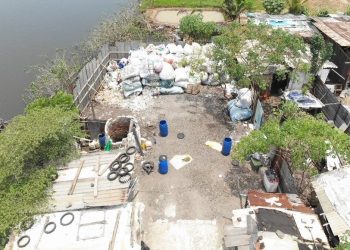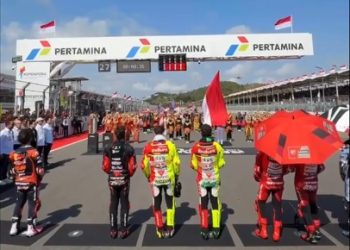Jakarta, Indonesia Sentinel — Indonesian President Prabowo Subianto has announced an average 6.5% increase in the national minimum wage for 2025, surpassing 2024 minimum wage’s 3.6% adjustment. The announcement was made during a press conference on Friday, November 29 2024.
Announcing at the Presidential Palace in Jakarta, President Prabowo accompanied by several minister, including Coordinating Minister for Economic Affairs Airlangga Hartarto, Minister of Manpower Yassierli, and Finance Minister Sri Mulyani.
“We just concluded a limited meeting, primarily to discuss the 2025 minimum wage,” Prabowo stated. He emphasized that the wage increase aims to bolster workers’ purchasing power while maintaining business competitiveness.
“Initially, the Minister of Manpower [Yassierli] proposed a 6% increase in the minimum wage. However, after discussions and consultations with labor leaders, we decided to raise the 2025 national minimum wage by an average of 6.5%,” Prabowo states.
The President clarified that sectoral minimum wages will be determined by provincial and municipal wage boards, with further details to be outlined in a forthcoming ministerial regulation.
Highlighting the importance of labor welfare, Prabowo reaffirmed his administration’s commitment to improving workers’ living standards. “We will continue to advocate for better conditions for our workforce,” he stated.
The 6.5% increase is expected to enhance workers’ welfare. Based on the average minimum wage of Rp3.1 million ($197) in 2024, the new rate for 2025 is projected to rise to Rp3.3 million ($210).
Timeline for Implementation
Separately, Minister of Manpower Yassierli announced that the ministerial regulation on the new minimum wage would be issued on Wednesday, December 4, 2024. He urged regional governments to promptly enact their respective regulations to align with the national directive.
“Our next steps include governors setting provincial minimum wages, followed by municipal and sectoral minimum wages. Internally, we aim to complete this process before December 25,” Yassierli said at the Presidential Palace.
The minister also called for close collaboration between central and regional governments to ensure a smooth implementation of the wage increase. “Given that the circumstances differ from previous years, we hope for strong synergy in executing this policy,” he noted.
Responses from Labor Unions
The Confederation of Indonesian Trade Unions (KSPI), led by Said Iqbal, expressed support for the decision, noting it aligns closely with the unions’ initial demand for an 8% increase.
“President Prabowo’s decision to set a 6.5% increase demonstrates his commitment to workers. We accept and appreciate this decision,” Iqbal stated during a press conference on Friday evening.
President Prabowo Breaks Down in Tears While Committing to Increase Teacher Salary
However, the Confederation of Nusantara Trade Unions (KSPN) offered different response. Citing from CNBC Indonesia, KSPN President Ristadi questioned the government’s focus on a flat percentage increase rather than a formula-based approach, arguing it could exacerbate regional wage disparities.
“For instance, in Karawang, where the minimum wage is around Rp5 million ($318), a 6.5% increase adds approximately Rp325,000 ($21). Meanwhile, in Yogyakarta, with a minimum wage of around Rp2 million ($127), the increase is just Rp130,000 ($8),” Ristadi explained.
He warned that such disparities could deepen income inequality across regions and prompt businesses to relocate to areas with lower wages.
Despite these concerns, KSPN acknowledged the positive intentions behind the policy, recognizing it as evidence of President Prabowo’s concern for workers’ welfare.
The 2025 wage policy reflects the government’s efforts to strike a balance between labor interests and business viability while addressing broader economic challenges. However, ongoing dialogue with stakeholders will be crucial to ensuring equitable outcomes for workers across Indonesia.
(Raidi/Agung)


























